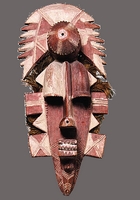|
|
Restitution of lots of art objects
A moral duty for Africa !
A crucial issue for
rehabilitate the history of peoples

For many years, the question of the
restitution of African art objects looted during colonization has been
a hot topic. Western museums are full of pieces of African art and many
Africans want to recover these looted objects. What can the restitution
of these art objects bring to African people today ?
This
restitution is both full of meaning and decisive for the historicity of
the African continent. The impact of the return of these leaders
of work on their land of origin has of course historical value,
artistic and cultural for the African people who inherited it of their
ancestors. For the African people, these objects are symbols of their
identity and have deep meaning. This art is an integral part of African
history. It is a considerable part of its cultural heritage. Let us
remember that the spoliation of
these objects was not only an act of theft, but also a symbolic gesture
which marked the different periods of colonial domination. The objects
were taken from African people with the sad aim of depriving them of
their history, humiliating them and dominating them culturally. This is
why their restitution would provide justice to African peoples once
stripped of their cultural heritage.
This is obviously
a moral duty for the former colonial powers. It also marks recognition
of past wrongs and allows concrete steps to be taken now to right the
injustices committed. Through restitution, the countries having removed
these works of art from
their continent of origin recognize that African people are the
rightful owners of their cultural heritage and that their history must
be celebrated and protected.
It is therefore an act of justice, a
recognition of history and a moral duty. European museums have a
pivotal role to play in this matter and must demonstrate goodwill to
return these objects to the African people who created and venerated
them for centuries. This is a considerable step towards cultural
reconciliation and mutual respect between peoples.
Durand BIYONG
|
|


